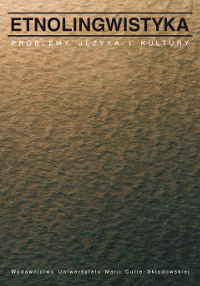Pojęcie równości i jego profilowanie we współczesnym języku polskim
The concept of equality and its profiling in contemporary Polish
Author(s): Jerzy Bartmiński, Grzegorz ŻukSubject(s): Anthropology, Language studies, Language and Literature Studies, Applied Linguistics, Philology
Published by: Wydawnictwo Naukowe Uniwersytetu Marii Curie-Sklodowskiej
Keywords: linguistic worldview; values; cognitive definition; profiling; contemporary Polish; colloquial style; common cultural ground; equality
Summary/Abstract: The aim of the article is to reconstruct the concept of equality through the cognitive definition, in accordance with the ideas proposed by Anna Wierzbicka and Jerzy Bartmiński. The method allows the scholar to present the whole semantic richness of a word, its place in the lexical-semantic field and in the network of conceptual relations. Because the notion of equality will be subjected to cross-linguistic analysis, the tertium comparationis is the colloquial style in an anthropological understanding, which corresponds to van Dijk’s communicative universe, i.e. the cultural common ground.The data come from three types of sources: dictionaries of the Polish language, questionnaires, and texts of various styles and genres, mainly journalistic. On this basis, the properties of eqality recognized by speakers of Polish have been identified, including base elements, common to various types of discourse, and elements of a limited range, usually associated with one discourse type.The basic defining features of equality include: (1) the principle to be practised; (2) a relational aspect, obtaining between people and groups of people; (3) omission of the differences between people (within a certain range): (4) the omission resulting from human dignity or (5) from the same rights, or else (6) because omission of differences (within a range) is socially beneficial.The shaping of the variants of equality at the level of discourse is connected with the speakers’ points of view and goals, as well as with their value system (the ideological directionality of the discourse). The following types of discourse have been identified: leftwing, feminist (moderate and radical), liberaldemocratic, anarchist (radically liberal), national and rightwing, Catholic (typical of the Catholic Church). Each type is maintained by a specific social subject.
Journal: Etnolingwistyka. Problemy Języka I Kultury
- Issue Year: 21/2009
- Issue No: 21
- Page Range: 47-67
- Page Count: 21
- Language: Polish

